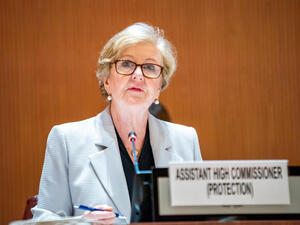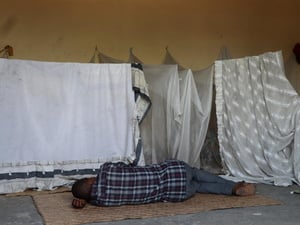Protection
Protection
Refugees fleeing war or persecution can be very vulnerable. They have no protection from their own state and it is often their own government that is persecuting them. If other countries do not let them in or protect them, they may be condemned to an intolerable situation where their basic rights, security and even their lives are in danger.

At UNHCR, we seek to uphold the basic human rights of uprooted or stateless people in their countries of asylum or habitual residence, ensuring that refugees will not be returned involuntarily to a country where they could face persecution. Longer term, we also help refugees find solutions, by repatriating voluntarily to their homeland, integrating in countries of asylum or resettling in third countries.
In many countries, our staff work alongside other partners in a variety of locations ranging from capital cities to remote camps and border areas. They attempt to promote or provide legal and physical protection, and minimize the threat of violence – including sexual assault – which many refugees are subject to, even in countries of asylum. They also seek to provide at least a minimum of shelter, food, water and medical care in the immediate aftermath of any refugee exodus.
Global operations
Providing emergency help to those forced to flee is often the first step towards long-term protection and rehabilitation. UNHCR has developed a global network of suppliers, specialist agencies, and partners that enables rapid delivery of essential supplies in emergencies and supports UNHCR's long-term programmes and operations. Projects can range from dispatching emergency teams to the scene of a crisis, providing emergency food, shelter, water and medical supplies, and arranging major airlifts for a large exodus of refugees or a flotilla of small boats for smaller numbers of fleeing civilians. Among a host of other programmes, there are projects to help protect the environment, build schools and raise awareness of such problems as HIV/AIDS.
Promoting refugee protection
Our activities to promote refugee protection include:
- Promoting accession to the 1951 Convention relating to the Status of Refugees and its 1967 Protocol, to the 1954 Convention relating to the Status of Stateless Persons and to the 1961 Convention on the Reduction of Statelessness. In 1999, UNHCR launched a campaign to promote accession to the 1951 Convention that culminated on its 50th anniversary in July 2001 and the Ministerial Meeting of States Parties to the 1951 Convention on 12 and 13 December 2001.
- Assisting States to enact or revise national refugee legislation, including administrative instructions and operational guidelines, and to implement national refugee status determination procedures.
- Strengthening relevant administrative and judicial institutions, training staff of government and non-governmental agencies, and liaising with relevant human rights bodies.
UNHCR is also involved in:
- research and advice on new laws and regulations affecting people of concern;
- technical and financial support for law schools, governmental agencies (including the police and the military) and other institutes to develop refugee law courses;
- support for human rights and refugee rights advocacy groups, legal aid centres and non-governmental organizations with an interest in refugee protection.









